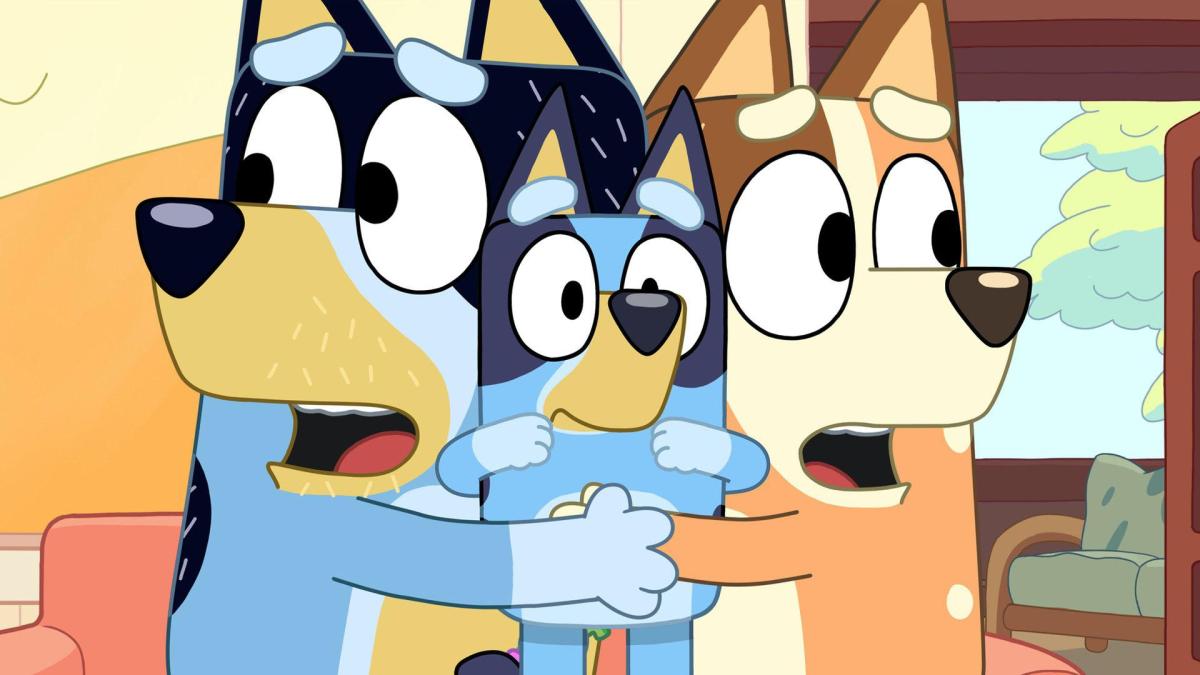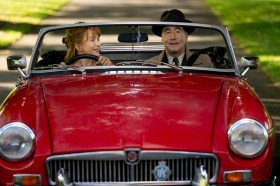The beloved and globally successful ABC Kids animation Bluey, created by Joe Brumm, has been in the news a fair bit recently. Usually, this Australian series about a Blue Heeler cattle dog and her family would be gaining attention due to its winning formula of children’s comedy sensibilities and well crafted emotional tone – but not this time.
Australians have been surprised to discover that many scenes in Bluey, and in one case an entire episode, have been censored on US networks. The changes have only been noticed recently, when American viewers discovered the ‘lost’ scenes and questioned what had happened.
@world.shaker 7 Things Disney Censored in #Bluey Season 3 #blueytok #parents #momsoftiktok #dadsoftiktok ♬ Bluey Theme Tune – Extended – Bluey
The video above depicts US-based TikTok user ‘world.shaker’ listing censored moments from Bluey season 3. Such moments include Bandit (Bluey’s dad) getting hit in between the legs, and a depiction of unicorn excrement. The episode ‘Family Meeting’ was banned entirely, apparently for its use of fart jokes. You can also find an incomplete list of all things censored in Bluey on the Fandom Wiki – it’s already quite lengthy.
Read: ‘An idealised Australian ethos’: why Bluey is an audience favourite, even for adults without kids
Now that viewers all over the world are aware of the censorship, they want to know one thing: why?
Hush, puppies
To get to the bottom of what’s going on here, we spoke to Wendy Haslem, Associate Professor of Screen Studies at the University of Melbourne.
‘There is a high level of scrutiny and heated debate about the desire to protect children from media that might appear to be harmful, and it is a very contentious area,’ Haslem said. ‘Some argue that the sense of innocence associated with childhood needs to be protected and will advocate for editing out sequences, or language, or even banning certain media outright.
‘Others will see the value of the system of classification and the description of content, plus the provision of information as a way to decide what might not be suitable for young children. It has usually been a decision made by adults, and it is only really quite recently that children have been involved in researching the question of censorship and regulation of media.’
Are American children really all that different from Australian children? What do they need protecting from that Aussie kids don’t? Wendy explained:
‘Bluey is one of our more successful cultural/media exports and it does reveal slightly differing standards associated with children’s media in the US compared with Australia. This instance is another indication of those differences, as the Family Matters episode was fine to be shown on Australia’s national public broadcasting network, but not on Disney+.
‘That episode evidently did not meet Disney+’s guidelines for their own Standards and Practices at the time of evaluation. However, now that the episode is streamed on other platforms and readily accessible via a VPN, that decision is being re-assessed.’
Read: Bluey: is Bandit Heeler a bad dad?
Culture clash
‘There is a long history of adaptation of Australian media for an international audience, and this reveals that some forms of media change to reflect cultural distinctions. Take the changes in language in the US version of The Castle: they changed the word “rissole” to “meatloaf”, “tertiary education” to “college education”, and a reference to Hey Hey It’s Saturday was removed entirely. Bluey itself has been changed to take out references to vasectomies, to the birth of babies/puppies, and even to erase the image of poo that was excreted by a rainbow unicorn horse!’
Cultural distinctions aside, it must be said that everybody poops, and vasectomies (which have been changed to ‘getting dog teeth removed’) and births are part of everyday life in almost every culture. It is hard to distinguish the exact reasoning behind why these things were censored, especially when they were neither graphic nor gratuitous. The position offered by Disney was that it ‘did not meet standards’, which is about as vague as it gets.
‘This is an example of ‘internal’ industry censorship, or as Disney Jr might say, an example of where the content or themes didn’t meet their own specific programming standards,’ explained Haslem.
And it seems large swathes of the internet are completely against it, which is potentially why they are reconsidering the cuts. After all, since these censored moments have recently gone viral on TikTok and Twitter, Americans are able to see that they’re not getting the ‘real deal’.
‘There may be an additional level of interest now that the episode has received some additional attention in the media,’ said Haslem. ‘This episode of Bluey [Family Matters] is available via alternative forms of private web browsing, however, I understand that it will be shown on other streaming services within the US too.
Mark C Scott at The Conversation posited that Bluey should remain uncensored in order to retain its Australian originality.
‘Increased investment by streaming services will provide opportunities for Australian local content to be successful locally and globally. But for Australian television and films to be true cultural exports, the world should be seeing the version of ourselves we are seeing, too,’ Scott wrote.
‘The success of this relies on not only focusing on content production and local distribution, but including strategies that allow Australian content to remain free from localised edits, so it can truly reflect an Australian cultural export.’
Disney representatives have said they are currently re-evaluating their Bluey censorship decisions.





